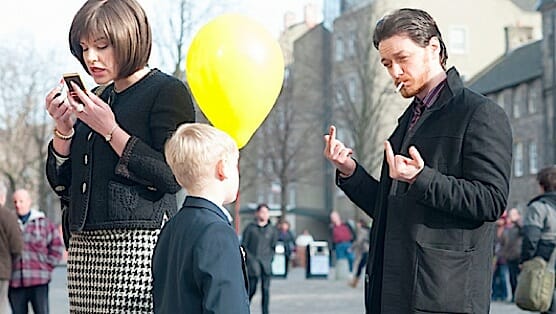
The year was 1998. George Clooney was still our Batman, the prospect of Y2K was starting to inspire sweaty palms and Irvine Welsh had just unleashed his third novel, Filth, on the world. Given the success of Danny Boyle’s adaptation of Trainspotting, producers were all too eager to get more of Welsh’s material on the big screen. (A desperate state of affairs that resulted in Paul McGuigan’s slapdash anthology film, The Acid House.) And yet, while the almost 400 pages of unhinged depravity and deplorable conduct assuredly had them salivating, no one seemed to possess the stones necessary to transform one of Welsh’s most grotesque fictional creations into flesh, blood and celluloid. And so the Mephistophelean figure of Bruce Robertson spent more than a decade twiddling his thumbs in development hell.
Writer-director Jon S. Baird has finally proven to be the one who dares rush in where angels fear to tread (and other directors have long ago lost interest in exploring). And while he elicits an uncharacteristically fearsome performance from James McAvoy as the dirty Edinburgh cop who serves the film’s festering heart and ink-black soul, Baird can’t escape the awkward question: Why exactly did he bother? No longer an attempt to strike while the Welsh iron is searingly hot, this adaptation never suggests that it has any particular reason for existing.
We’re never once convinced that this is a story that needs to be told. For the most part, it conducts itself like a lout who squares up to you in a bar, eager to see you flinch but uninterested in actually throwing down. (Unlike Abel Ferrara’s similarly debauched Bad Lieutenant, which yearned to jump a viewer and wrestle them into the moral muck from which it had slithered.) And once you’ve worked up the nerve to stare it down, you quickly see it for what it is: a lumbering, stitched together amalgam of stylistic flourishes and narrative devices.
But even if it’s all rather pointless, the unrepentantly nihilistic film does supply some dark pleasure to those viewers who don’t hold humanity in particularly high regard. In addition to being an alcoholic and drug addict, Bruce also dabbles as a homophobe, misogynist and racist. As two more character traits—one regarding his sartorial predilections, the other his psychological state—wait to be revealed, we become well-acquainted with the idea that this agent of chaos has never met someone who he didn’t want to fuck or fuck over. Taking the opportunity to spill seed practically every second scene, the sadist otherwise busies himself undermining his workplace rivals (including Jamie Bell and Imogen Poots, both underserved) and pilfering cash from a bookish accountant (Eddie Marsan, comically oscillating between meek and manic depending on how heavily Bruce has drugged him) while placing obscene phone calls to his demure wife (an equally but less effectively cartoonish Shirley Henderson).
An unreliable narrator begets a duplicitous framing device that calls into question the veracity of every one of Bruce’s claims and encounters. Add in fleet, fragmented fantasy sequences—featuring everything from nightmarish animal-faced men to Starsky & Hutch’s David Soul showing up to croon his 1977 hit “Silver Lady”—and viewers quickly grow wary of what might qualify as reality. Unfortunately, the onslaught of spectacle likewise creates an ambivalence regarding what might warrant any sort of emotional investment. A murder investigation provides the film’s scattershot plot points but seems almost an afterthought to Baird. Meanwhile, Bruce’s justifiably estranged wife (Shauna Macdonald) is intended to represent his last tie to humanity but is represented as simply another alluring bauble in an array of visual confections.
While Trainspotting similarly dabbled in excess, it was lent emotional heft by so humanely depicting a hopeless generation who seemingly never had a chance. There’s considerably less inherent tragedy in a sorry, unstable misanthrope throwing away all that he’s achieved. And given that there’s the distinct sense that the jig is up for Bruce from the film’s opening profane salvo, there’s little offered in terms of dramatic stakes. Ultimately, Bruce’s self-immolation can only dazzle us for so long before its lurid spell is broken.
Curtis Woloschuk is a member of the Vancouver Film Critics Circle, as well as publications editor and a programmer for the Vancouver International Film Festival. You can follow him on Twitter.
Director: Jon S. Baird
Writer: Jon S. Baird
Starring: James McAvoy, Jamie Bell, Imogen Poots, Eddie Marsan, Shirley Henderson, Shauna Macdonald, Jim Broadbent
Release Date: May 30, 2014